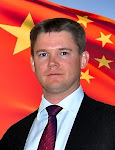The Silk Street, 秀水街, Xiùshuǐjiē, is Beijing's and Chinas biggest and most famous shopping center with focus on tourists. There are a line of competitor, but The Silk Street is the one with the biggest range of products, and is most clean. The other ones are a bit smaller and sometimes have a little more narrow product range. If you only have time to go to one market, then I propose to select The Silk Street because it is a tourist attraction in it self, and it have "everything".
The market is located on the east side between 2:nd and 3:rd ring road along the main street in Beijing, Changanjie, 长安街, that cut through the complete city from east to wets. You easy reach the place by subway Line 1, and jump of at station Yonganli, 永安里.
During the spring 2005 the market moved in to todays location. Before that it was an outdoor market in the hutong's. Today the market has about 200 000 visitors every week, and during the olympics it was close to 2 000 000 customers! The selling is separated into 1 500 small shops with totally 3 000(!) employees.
The building has selling on 7 floors, and the 2 highest have a bit more luxury shops, that I dont really think fit into the concept. The product range is more or less everything that a tourist want, and a big part is copies of famous brands. Today is the Chinese government a bit harder towards the selling of copies, so all brands are not shown open - but there are there to be find if you just mention the name.
On first and second floor sells cloth in all types. Jackets, trousers, skirts....
Third floor fit best into the name The Silk Street since it is here you can by the fabric, but also ties, scarfs and underwear.
Fourth floor has mainly piece of jewelry, watches, sunglasses and electronics.
In the basement you can find shoes, bags, belt and wallets.
Besides the main categories there are also a lot of other stuff like toys, the, decorations, pens etc.
The selling environment is very tiring because the sellers always shouting at you and sometimes try to grab you. It can be funny in the beginning but not in the long terms. The sellers has pretty strict regulations how they are allowed to act so for example they are not allowed to be rude.
Every previous published text about The Silk Street has a "school" about how to bargain and lists of what things shall cost, so I shall be the first without. You will learn pretty fast anyway. In general is the prices (after long bargain) considered pretty low by us from the west, so many comes out with much more thingt then initially planed.
How about the quality? Can be both very good and very bad. The thing is to look very careful on the thing that you will by, and then also try to be a bit lucky.

The south entrance of The Silk Street. Outside here it is always a full row of tourist busses that are waiting for there shopping passages.

My friends on floor F2. I have done pretty much shopping at there shop, so during the years we have become friends, and I dont have to bargain with them any more.

One of all seller of watches on floor F4. She is not so happy as it seams since I did not by her "Rolex" even if she told me "A-Quality, No Problem"





